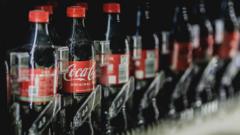Coca-Cola's CEO indicates a possible increase in plastic packaging in response to Trump’s import tariffs, further complicating the company's environmental commitments amidst criticism for plastic waste.
Coca-Cola Faces Shift to Plastic Due to Trump Tariffs

Coca-Cola Faces Shift to Plastic Due to Trump Tariffs
Coca-Cola may pivot to plastic bottles if aluminium costs surge from tariffs, impacting sustainability goals.
Coca-Cola's Chief Executive Officer, James Quincey, recently announced that the beverage giant might convert a larger portion of its packaging to plastic bottles in the United States if President Donald Trump’s new tariffs result in increased aluminium costs. The proposed 25% import tax on steel and aluminium could significantly raise the prices of canned beverages, leading Coca-Cola to adapt its strategy.
In light of the tariffs, which aim for a "Buy American" policy, Quincey emphasized the company's flexibility in using alternative packaging options. “If one package suffers some increase in input costs, we continue to have other packaging offerings that will allow us to compete in the affordability space,” he stated, highlighting that plastic bottles could become more prevalent if aluminium cans become too costly.
This potential shift to plastic comes amid Coca-Cola's previous commitments to sustainability. In December, the company scaled back its goal of incorporating 50% recycled materials in packaging by 2030 to a new target of 35% to 40% by 2035. Environmental advocates have consistently criticized Coca-Cola as the leading global plastic polluter for several years.
The use of aluminium cans had been a cornerstone of Coca-Cola's marketing strategy, touted for their higher recyclability compared to plastic. However, rising prices due to tariffs pose a direct challenge. The U.S. currently imports nearly half of its aluminium supply, making the impact of tariffs all the more pronounced in the beverage industry.
Adding to the environmental concerns, Trump has also opted to reverse previous efforts aimed at reducing plastic waste, such as the initiative to replace plastic straws with paper alternatives, further complicating the sustainability narrative.
As Coca-Cola navigates these new challenges, its future packaging choices could redefine its approach under ongoing scrutiny from both investors and environmentalists.



















